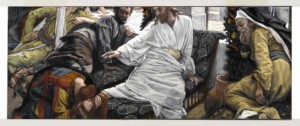Appearing normal, but underneath…
The experience was normal. What everyone would expect. Jesus, his family, his disciples, and their families walked the Jordan Valley roads along with hundreds of holiday travelers. The festive occasion: Passover and the Feast of Unleavened Bread.
Underneath the normal of that moment was the disruptive fact that Jesus was a wanted man. 4 weeks previously, in a suburb of the capital city and to the amazement of all, Jesus resuscitated a family friend. The religious authorities regarded this action as an exercise of trickery or sorcery – either was criminal – so they issued a warrant for his arrest (Talmud Sanhedrin 43a).
For 3 weeks afterwards, Jesus and his men withdrew into the hills between Judea and Samaria. Then they re-emerged to join the crowds for the feast.
Observe most people, and their lives appear normal. But like Jesus’ experience, underneath the normal are life-challenging disruptions. If attentive, we can see beyond the surface-normal, see into those challenges even as life goes on, just as it did around Jesus as he neared his own end.
